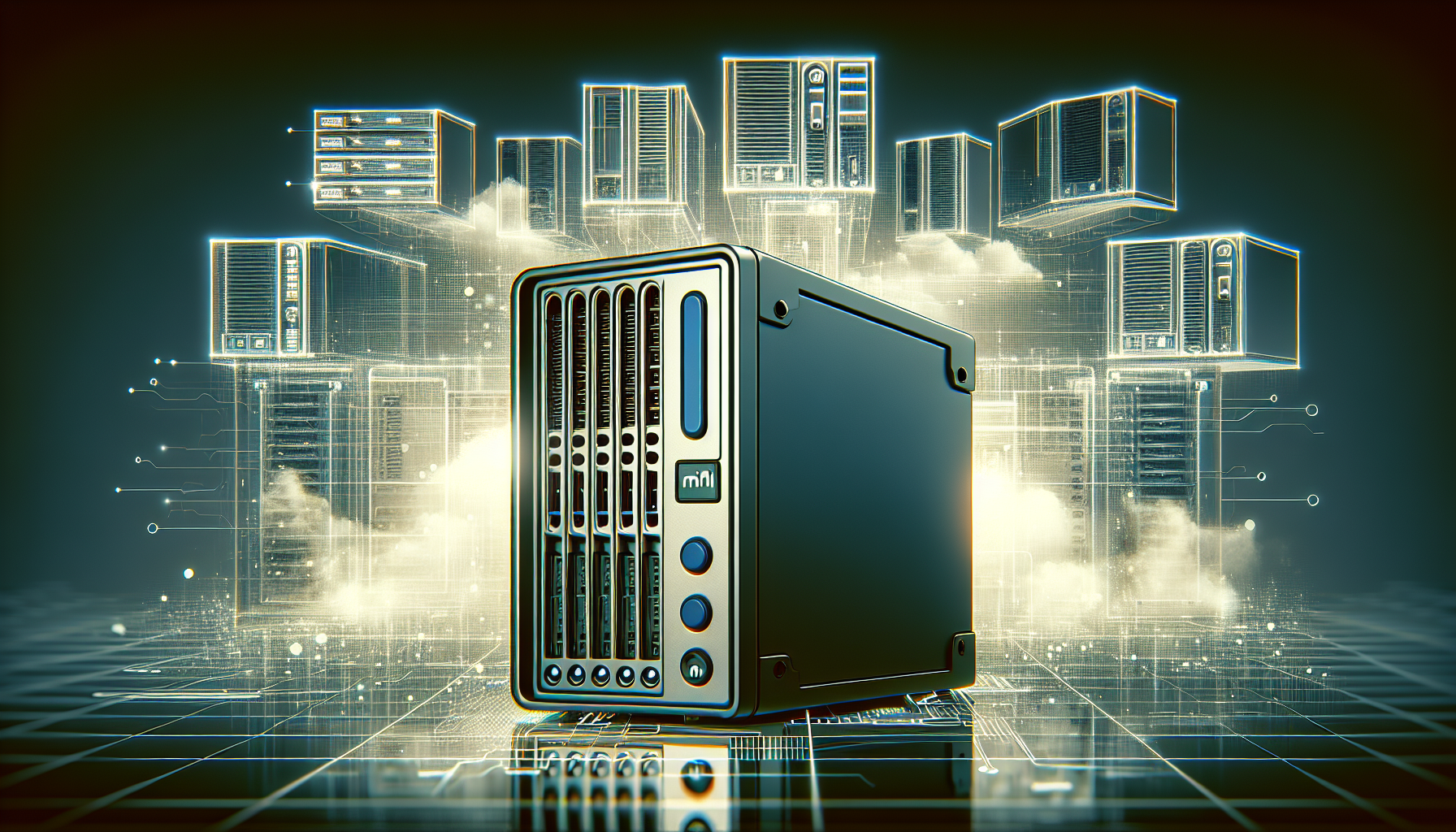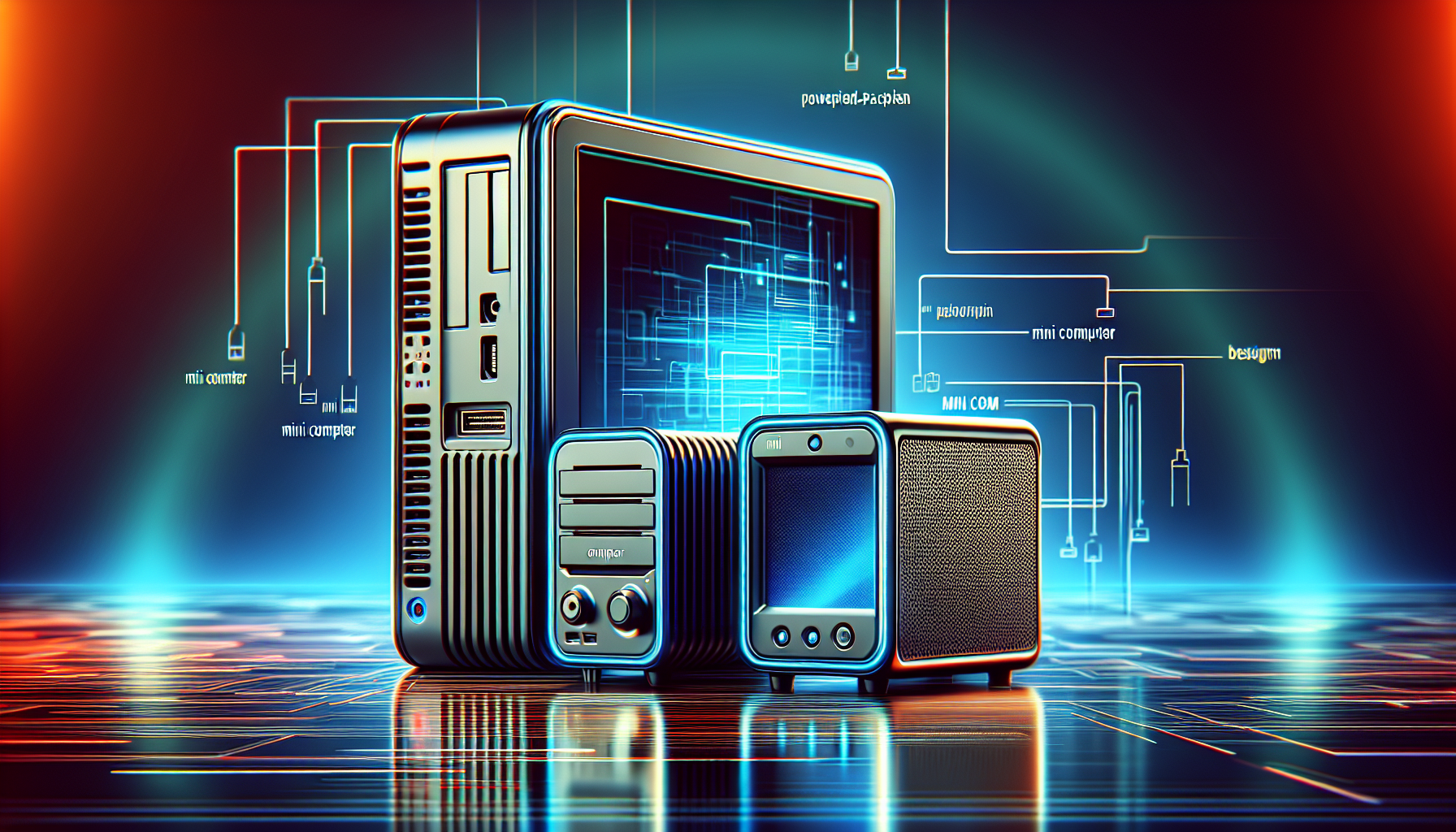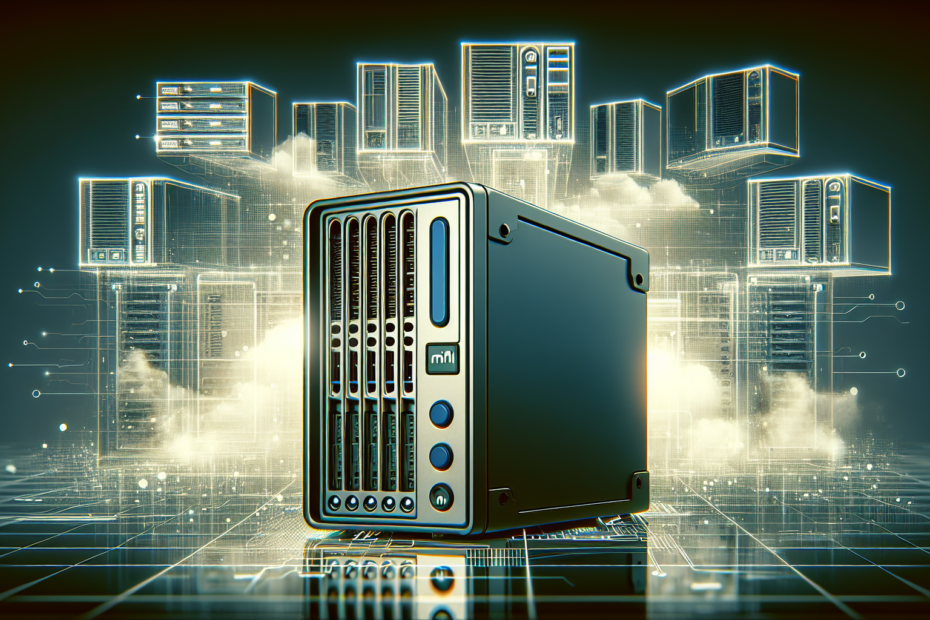



Have you ever wondered what the purpose of a mini computer is? These compact devices have become increasingly popular in recent years, offering a portable and versatile solution for various computing needs. From enhancing productivity on the go to providing entertainment and serving as a smart home hub, mini computers have quickly become essential tools for many. In this article, we will explore the diverse uses and advantages of mini computers, shedding light on why they have become a must-have in today’s digital age. So, grab your favorite beverage, sit back, and let’s uncover the fascinating world of mini computers together! A mini computer, also known as a small form factor computer, is a compact and portable computing device that is smaller in size and has lower processing power compared to traditional desktop computers. Despite their small size, mini computers have become increasingly popular due to their numerous advantages and diverse range of uses. In this comprehensive article, we will explore the definition of mini computers, delve into their history, discuss the advantages they offer, and explore the various fields and industries where mini computers find their applications.
Understanding Mini Computers
Definition of a Mini Computer
A mini computer is a small form factor computing device that is designed to be compact, portable, and energy-efficient. It typically has a smaller physical footprint compared to traditional desktop computers, making it well-suited for situations where space is limited. Mini computers often feature low-power processors, integrated graphics, and a variety of connectivity options, enabling them to perform a wide range of tasks.
History of Mini Computers
The history of mini computers dates back to the 1960s, where they emerged as a response to the need for smaller and more affordable computing solutions. The first mini computers were primarily used in scientific research, military applications, and large organizations. Over the years, advancements in technology have led to the development of more powerful and versatile mini computers. Today, mini computers have become an integral part of various industries and are widely used for a diverse set of purposes.
Advantages of Mini Computers
Portability and Size
One of the key advantages of mini computers is their portability and compact size. These devices are significantly smaller and lighter than traditional desktop computers, making them highly portable and easy to transport. Whether you need to carry your computer for work, travel, or educational purposes, a mini computer offers the perfect solution.
Low Power Consumption
Mini computers are designed to be energy-efficient, consuming significantly less power compared to traditional desktop computers. This low power consumption not only helps reduce electricity bills but also makes mini computers environmentally friendly. It also allows mini computers to operate on battery power for extended periods, making them ideal for situations where a constant power source may not be available.
Cost-Effective Solution
Another advantage of mini computers is their cost-effectiveness. These devices are generally more affordable compared to traditional desktop computers, making them an attractive option for budget-conscious individuals and businesses. With advancements in technology, mini computers now offer comparable performance to their larger counterparts at a fraction of the cost, providing excellent value for money.
Space Efficiency
Mini computers are designed to occupy minimal space without compromising on performance. Their smaller physical footprint makes them ideal for environments where space is limited, such as small offices, classrooms, or home setups. Additionally, mini computers can be easily mounted on walls or placed in tight spaces, further optimizing the efficient use of space.

Uses of Mini Computers
Embedded Systems
Mini computers are widely used in embedded systems, where they are integrated into other devices or machinery to provide computing capabilities. Whether it’s controlling industrial machinery, monitoring environmental conditions, or powering smart appliances, mini computers play a crucial role in the functioning of embedded systems.
Home Entertainment
Mini computers have gained popularity as home entertainment devices, providing a versatile and compact solution for media consumption, gaming, and streaming. With the ability to connect to televisions or projectors, mini computers can transform any living space into a home theater, offering a wide range of entertainment options for individuals and families.
Education and Learning
In the field of education, mini computers have become indispensable tools for both students and educators. Their small size and portability make them ideal for educational institutions where students frequently move between classrooms or require access to computing resources outside of traditional computer labs. Mini computers also offer the flexibility to customize and configure educational software and applications according to specific learning needs.
Industrial Automation and Control Systems
Mini computers find widespread use in industrial automation and control systems, where they serve as the brains behind the machinery and equipment used in manufacturing processes. From controlling robots on assembly lines to monitoring and optimizing production workflows, mini computers play a pivotal role in enabling efficient and precise industrial automation.
Internet of Things (IoT) Solutions
With the rapid growth of the Internet of Things (IoT), mini computers have become essential components in various IoT solutions. Mini computers facilitate the connectivity and processing power required for IoT devices, enabling them to collect and analyze data, communicate with other devices, and perform complex tasks.
Mini Computers in Business
Business Process Optimization
Mini computers are valuable tools for optimizing business processes, particularly in small and medium-sized enterprises (SMEs). They provide the necessary computing power to streamline operations, manage inventory, process transactions, and centralize data, resulting in improved efficiency, reduced costs, and enhanced productivity.
Digital Signage and Kiosks
Mini computers are widely used in digital signage and kiosk systems, where they serve as the backbone for delivering and managing dynamic content. Whether it’s displaying advertisements, providing interactive information, or facilitating self-service options, mini computers play a critical role in creating engaging and personalized experiences for customers in various retail and public settings.
Point of Sale (POS) Systems
Mini computers find extensive use in point of sale (POS) systems, where they provide the computing power required for processing transactions, managing inventory, and generating sales reports. Mini computers integrated into POS systems offer a compact and efficient solution for businesses, enabling them to streamline their operations, enhance customer service, and improve overall business performance.
Data Analysis and Visualization
Mini computers are increasingly employed for data analysis and visualization tasks in business environments. With their compact size and processing capabilities, mini computers facilitate real-time data processing, data mining, and the generation of interactive visualizations. These capabilities enable businesses to gain valuable insights from large datasets and make data-driven decisions.

Mini Computers in Research and Development
Prototyping and Testing
Mini computers play a vital role in the research and development (R&D) process by providing a compact and flexible platform for prototyping and testing. Their small size and portability allow researchers and developers to quickly iterate on their designs, evaluate performance, and validate concepts before scaling up to larger systems.
Scientific Simulations
Mini computers are used in scientific simulations to model complex phenomena and analyze data. From simulating weather patterns to predicting the behavior of molecular structures, mini computers offer the computational power required for running resource-intensive simulations in fields such as physics, chemistry, and biology.
Data Collection and Analysis
Mini computers find applications in collecting and analyzing data in various research domains. Whether it’s monitoring environmental conditions, recording biological data, or analyzing data from experiments, mini computers provide the necessary computing capabilities to gather, process, and analyze data in real-time.
Mini Computers in the Medical Field
Patient Monitoring Systems
Mini computers are extensively used in patient monitoring systems, where they enable healthcare professionals to remotely monitor vital signs, analyze patient data, and provide real-time feedback. Mini computers embedded in wearable devices or integrated into healthcare facilities play a significant role in improving patient care and facilitating remote healthcare services.
Medical Imaging and Diagnostics
Mini computers are essential in medical imaging and diagnostics, where they power advanced imaging technologies such as computed tomography (CT) scanners, magnetic resonance imaging (MRI) machines, and ultrasound devices. These devices require high computing power to process and analyze intricate medical images, aiding doctors in accurate diagnosis and treatment planning.
Healthcare Information Systems
Mini computers are integral to healthcare information systems, enabling the secure storage, retrieval, and processing of patient data. From electronic health records to medical billing systems, mini computers ensure the efficient management and accessibility of critical healthcare information, enhancing patient care and facilitating seamless coordination among healthcare providers.
Gaming and Entertainment with Mini Computers
Mini PCs as Gaming Consoles
Mini computers can be transformed into gaming consoles, offering a compact and versatile alternative to traditional gaming setups. By connecting a mini computer to a high-definition television or monitor, gamers can enjoy immersive gaming experiences, play the latest titles, and even connect multiple controllers for multiplayer gaming.
Media Centers and Streaming Devices
Mini computers serve as excellent media centers and streaming devices, providing a convenient platform for accessing and enjoying a wide range of digital content. By connecting a mini computer to a television or audio system, users can stream movies, TV shows, music, and online content, transforming their living rooms into entertainment hubs.
Mini Computers in the Automotive Industry
In-Car Infotainment Systems
Mini computers play a crucial role in in-car infotainment systems, offering a range of features and services to enhance the driving experience. From navigation and multimedia capabilities to connectivity features and voice control, mini computer-based infotainment systems provide drivers and passengers with seamless access to information, entertainment, and communication options while on the road.
Telematics and Vehicle Tracking
Mini computers are used extensively in telematics systems, which enable wireless communication and data exchange between vehicles and external systems. By integrating mini computers into vehicles, telematics technology provides real-time vehicle tracking, remote diagnostics, fleet management, and other advanced features that enhance safety, efficiency, and compliance in the automotive industry.
Advanced Driver Assistance Systems (ADAS)
Mini computers are essential components in advanced driver assistance systems (ADAS), which aim to improve road safety and enhance driving by providing assistance and automation. From collision warning systems and adaptive cruise control to lane departure warnings and automated parking, mini computer-based ADAS technologies rely on powerful computing capabilities to analyze sensor data and provide real-time decision-making algorithms.
Challenges and Limitations of Mini Computers
Limited Processing Power
Due to their compact size, mini computers often have limited processing power compared to their larger counterparts. While they can handle everyday computing tasks and run certain software applications, resource-intensive tasks such as video editing or running complex simulations may be limited by their processing capabilities.
Limited Storage Capacity
Mini computers also tend to have limited storage capacity compared to traditional desktop computers. This limitation may require users to rely on external storage devices or cloud storage solutions for storing and accessing larger files or extensive data sets. However, advancements in solid-state drive (SSD) technology have significantly increased the storage capacity available in mini computers.
Compatibility and Upgradability Challenges
Mini computers may face compatibility and upgradability challenges due to their smaller form factor. Upgrading hardware components or peripherals, such as graphics cards or memory modules, may be more challenging compared to traditional desktop computers. Additionally, compatibility issues with certain software applications or peripherals may arise due to the hardware limitations of mini computers.
Heat Dissipation Issues
The compact size of mini computers often leads to heat dissipation challenges. As mini computers pack powerful components into a smaller space, heat buildup can become a concern. Adequate cooling solutions, such as fans or heat sinks, are critical to ensure optimal performance and prevent thermal issues that could affect the longevity of the device.
Future Trends in Mini Computing
Increased Integration of Artificial Intelligence and Machine Learning
As artificial intelligence (AI) and machine learning (ML) technologies continue to advance, mini computers are likely to incorporate these capabilities in their compact form factors. Mini computers with built-in AI and ML capabilities will be able to perform complex tasks such as image recognition, natural language processing, and predictive analytics, opening new possibilities for automation and intelligent decision-making.
Enhanced Connectivity and Networking
With the proliferation of IoT devices and the need for seamless connectivity, future mini computers are expected to offer enhanced networking capabilities. This includes support for faster wireless standards, increased Ethernet connectivity options, and improved integration with IoT protocols. The enhanced connectivity will enable mini computers to seamlessly interact with a wide range of devices, facilitating data exchange and communication in interconnected systems.
Mini Computer Clusters for High Performance Computing
Mini computers are increasingly being used in high-performance computing (HPC) applications, where multiple mini computers are combined to form clusters. This cluster computing approach enables mini computers to work in parallel, significantly increasing their overall processing power. In the future, mini computer clusters are expected to become even more prevalent in fields such as scientific research, data analysis, and artificial intelligence, offering cost-effective alternatives to traditional HPC solutions.
In conclusion, mini computers have evolved into powerful and versatile devices that offer numerous advantages in terms of portability, low power consumption, cost-effectiveness, and space efficiency. Their compact size and diverse range of uses make them indispensable in various fields and industries, ranging from business optimization and research and development to the medical field and gaming. While mini computers may face challenges and limitations such as limited processing power and storage capacity, advancements in technology continue to push the boundaries of mini computing. With future trends focusing on increased integration of AI and ML, enhanced connectivity, and the emergence of mini computer clusters, the potential for mini computers to revolutionize computing experiences and drive innovation remains promising.
Disclosure: As an Amazon Associate, I earn from qualifying purchases.






